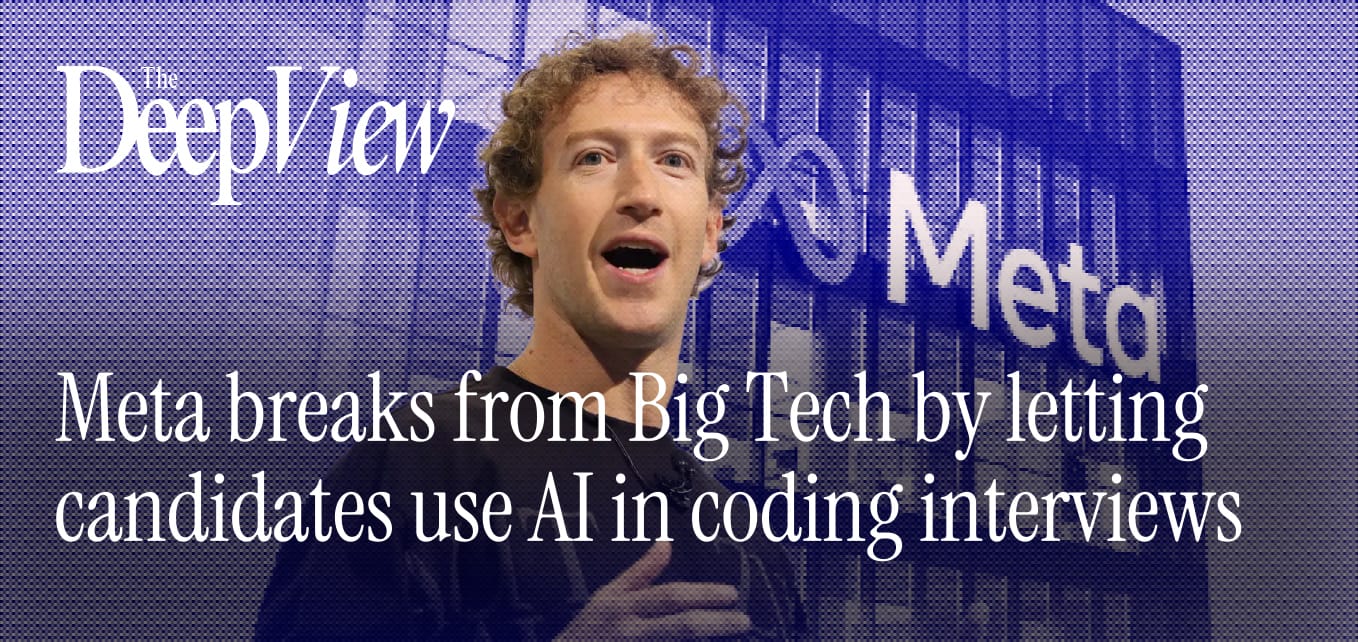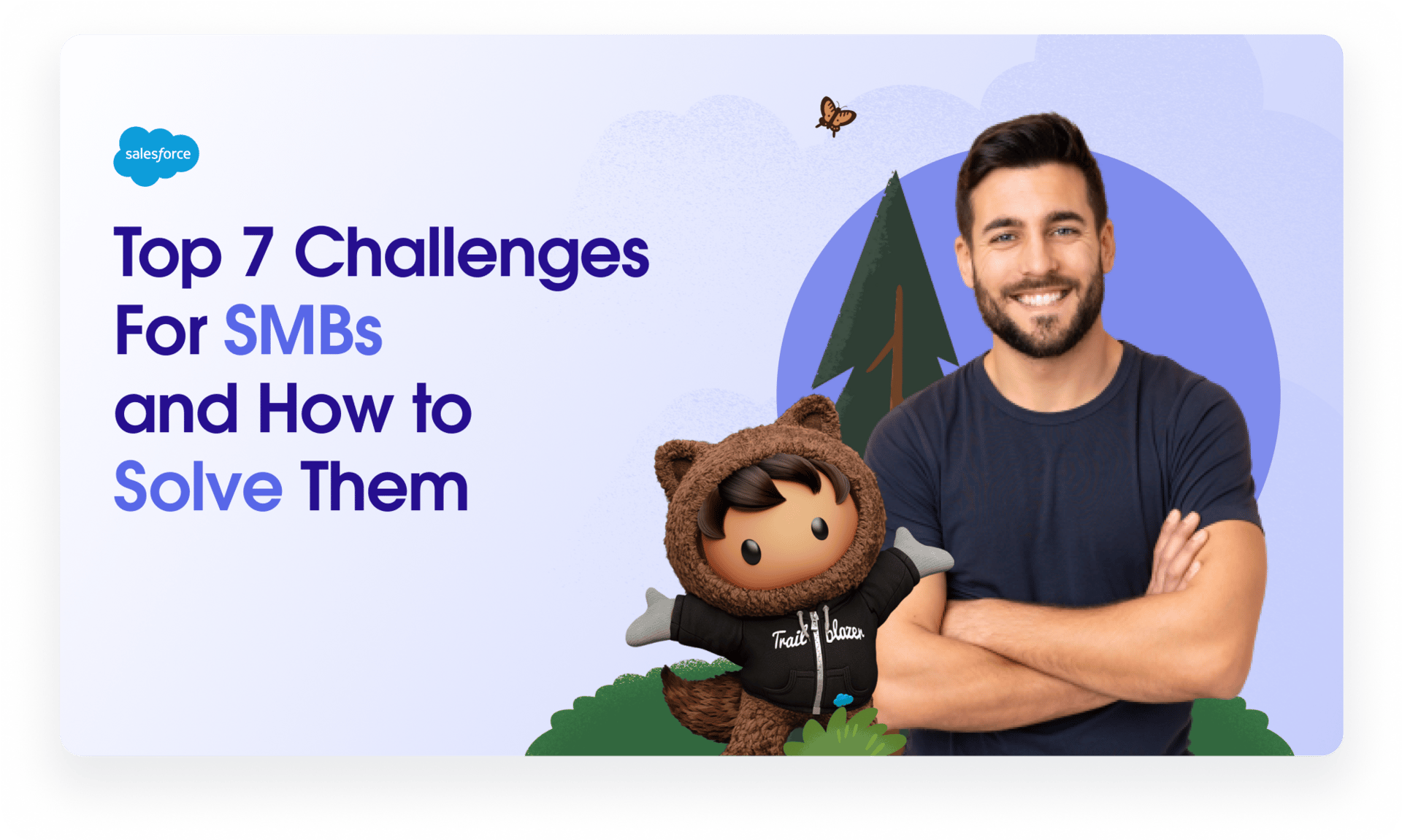- The Deep View
- Posts
- Meta lets job candidates cheat with AI
Meta lets job candidates cheat with AI

Welcome back. Meta approached over a dozen people at Thinking Machines Lab with one offer topping $1 billion over multiple years—and achieved a perfect zero percent success rate. Even Zuckerberg's money can't buy you love (or top AI talent from TML, apparently).
1. Meta breaks from Big Tech by letting candidates use AI in coding interviews
2. OpenAI fights back against student cheating with ChatGPT's new Study Mode
3. Anthropic nears $5 billion round at $170 billion valuation
WORKPLACE
Meta breaks from Big Tech by letting candidates use AI in coding interviews

Meta is testing something that would have been unthinkable just two years ago: allowing job candidates to use AI assistants during coding interviews.
According to internal communications seen by 404 Media, the company told employees it's developing "a new type of coding interview in which candidates have access to an AI assistant." The reasoning? This approach is "more representative of the developer environment that our future employees will work in, and also makes LLM-based cheating less effective."
The move puts Meta at odds with competitors like Anthropic, which initially banned AI use entirely before recently reversing course. But Meta's experiment reflects a much larger transformation happening across the employment ecosystem.
An entire startup economy has emerged around AI-powered recruiting:
Paradox's "Olivia" chatbot handles screening and scheduling for high-volume hiring
HireVue processes over a million job seekers annually through AI-powered video interviews
Eightfold AI uses deep learning to identify 67% more qualified candidates than traditional systems
LinkedIn's new AI-Assisted Search lets recruiters type conversational queries and instantly get candidate recommendations
Cluely, the controversial startup that's raised $20.3 million (led by a16z), operates through an undetectable browser window that provides real-time AI assistance during interviews. Founded by Columbia dropouts who were expelled for using their "Interview Coder" tool, Cluely is already profitable with over $7 million in annual recurring revenue.
Companies use AI to hire people based partly on their ability to work with AI, then require them to use AI in their daily work. Microsoft's research found that fewer than 3% of companies qualify as "frontier firms" with advanced AI deployment, but those that do report significant advantages.
Once hired, the integration continues. As we've seen with Duolingo's "AI-first" mandate and Shopify's (and plenty of others) similar moves, companies are requiring employees to use AI tools as part of performance evaluations.
Meta is seeking current employees to volunteer for "mock AI-enabled interviews" to refine the process. CEO Mark Zuckerberg told Joe Rogan in January that by 2025, Meta would "have an AI that can effectively be a sort of midlevel engineer."
Yet this raises fundamental questions about what we're actually hiring for. Traditional coding interviews test algorithmic thinking under pressure. AI-enabled interviews test collaboration with tools that may fail unexpectedly. The skills overlap but aren't identical.

Meta's decision represents a pragmatic acknowledgment of reality rather than revolution. Candidates have been using AI to cheat for months already. By bringing it into the open, Meta is testing what actually matters… can someone work effectively with imperfect tools?
The broader AI-ification of hiring worries us more. We're optimizing for AI collaboration before understanding what makes someone good at it. The startup ecosystem reflects this confusion with some tools building the future, while companies like Cluely leverage the chaos for profit.
The risk is creating workers who excel at prompt engineering but struggle when technology fails. The most successful approach will likely be narrow, evidence-based adoption rather than wholesale transformation.
TOGETHER WITH TELUS DIGITAL
Webinar: From AI hype to frontline success
AI moves fast — but implementing it effectively is the key to success. Join Fuel iX and guest Forrester for an insightful discussion on how enterprises can harness the power of GenAI copilots to drive innovation and productivity across their organization.
This exclusive session will explore:
The current landscape of GenAI and why enterprises need to act now
Practical strategies to overcome barriers in AI implementation
Real-world success stories of AI copilots transforming businesses
How Fuel iX empowers organizations to customize and scale AI solutions
EDUCATION
OpenAI fights back against student cheating with ChatGPT's new Study Mode

OpenAI launched Study Mode for ChatGPT this week, a feature designed to stop giving students direct answers to homework questions.
Instead of spitting out essay conclusions or math solutions, Study Mode uses Socratic questioning to guide students through problems step by step. When a student asks for help with calculus, ChatGPT responds with "What do you think the first step is?" rather than solving the equation outright.
The numbers driving this shift are staggering:
One in three college-aged people use ChatGPT, with learning as the top use case
U.S. teen usage for schoolwork doubled from 13% to 26% between 2023 and 2024
Khan Academy's AI tutor Khanmigo reached 700,000 users across 380 school districts last year
OpenAI developed Study Mode with teachers and pedagogy experts, rolling it out to Free, Plus, Pro and Team users. The approach mirrors Anthropic's Learning Mode for Claude, launched in April, suggesting the entire industry recognizes this problem.
But here's the obvious flaw. Students can toggle back to regular ChatGPT anytime they want actual answers.
Common Sense Media's test revealed the absurdity. When asked to write about "To Kill a Mockingbird" with typos to sound like a ninth-grader, regular ChatGPT complied instantly. Study Mode replied "I'm not going to write it for you but we can do it together!"
This represents OpenAI's bet that students want to learn responsibly rather than cheat efficiently. The feature operates entirely on the honor system.
It's educational optimism meeting technological reality, and the results will likely say more about human nature than AI.
TOGETHER WITH SALESFORCE
Can You Solve These Top SMB Challenges?
Salesforce recently put together a list of the Top 7 Challenges For SMBs, which includes everything from the classic (managing growth with lean teams) to the cutting edge (adopting AI without losing the human touch). But did they stop at identifying the challenges? Nope – they went ahead and solved them, too.
From meeting with experts and breaking down real-world examples to finding the most useful tools for small business owners like you, all their biggest takeaways are compiled in this handy report (which you can download for free).
FUNDING
Anthropic nears $5 billion round at $170 billion valuation

The AI funding arms race just hit another milestone. Anthropic is closing a $5 billion funding round led by Iconiq Capital that would value the Claude maker at $170 billion, according to Bloomberg.
The deal would nearly triple Anthropic's valuation from the $61.5 billion it achieved just four months ago in March. If completed, it would make Anthropic the second most valuable AI company behind OpenAI, which closed a record $40 billion round at a $300 billion valuation in March.
The numbers reveal just how frenzied AI investing has become:
Anthropic's valuation jumped 176% in four months
OpenAI nearly doubled its valuation from $157 billion to $300 billion
The generative AI market is projected to exceed $1 trillion within a decade
Both companies are courting Middle East sovereign wealth funds
Anthropic is reportedly in talks with Qatar Investment Authority and Singapore's GIC about joining the round, following a pattern where AI companies increasingly look beyond traditional Silicon Valley investors.
Now Anthropic, which has positioned itself as the safety-conscious alternative to OpenAI, is capitalizing on investor appetite for AI diversification. Both rounds dwarf traditional venture investments. OpenAI's $40 billion raise was nearly three times larger than any previous private tech funding, according to PitchBook data.
Investors believe the AI revolution is just getting started, and they're willing to pay unprecedented sums to own a piece of it.
LINKS

Photoshop just made it shockingly easy to edit objects and people into photos
Microsoft nears OpenAI agreement for ongoing tech access
JPMorgan Chase nears a deal to take over Apple’s credit-card program
Palo Alto Networks nears over $20b deal for cybersecurity firm CyberArk
Runway, Luma target sales to robotics companies
AI chip startup Groq nears $600m fundraising deal
Google AI Mode adding Search Live video, Canvas, PDF upload and more

Cursor 1.3: Shared terminal with Agent, context usage in chat and faster edits
CopyCat: Build browser automations with AI
Doco: Built right into Microsoft Word, it knows your files and understands your workflows
Jotfrom Gmail Agent: AI Agent in your Gmail account and instantly get draft responses for every incoming customer email

Soundhound AI: Project Manager, Enterprise
Dataiku: Customer Success Engineer
Waymo: Technical Program Manager, Expansion
Figure AI: Manufacturing Engineer Intern (Fall 2025)
POLL RESULTS
China’s new AI model is faster, cheaper and more reliable. What matters most to you?
Cost per token (19%)
Real-world reliability (50%)
Speed of response (9%)
Who builds it (22%)
The Deep View is written by Faris Kojok, Chris Bibey and The Deep View crew. Please reply with any feedback.
Thanks for reading today’s edition of The Deep View! We’ll see you in the next one.

“[The other image] is just TOO perfect in terms of the way that the photo is shot. The car, the dust clouds, and the lighting, it's just too good to be true and doesn't look real.” “The giveaway was the undercarriage of [the other option]. Clearly, the AI did not understand the routing of exhaust and the drive chain.” |
 | “Both of these look unbelievable!” “I couldn't figure out what the heck was going on with the white cars...” |

Take The Deep View with you on the go! We’ve got exclusive, in-depth interviews for you on The Deep View: Conversations podcast every Tuesday morning.

If you want to get in front of an audience of 450,000+ developers, business leaders and tech enthusiasts, get in touch with us here.





